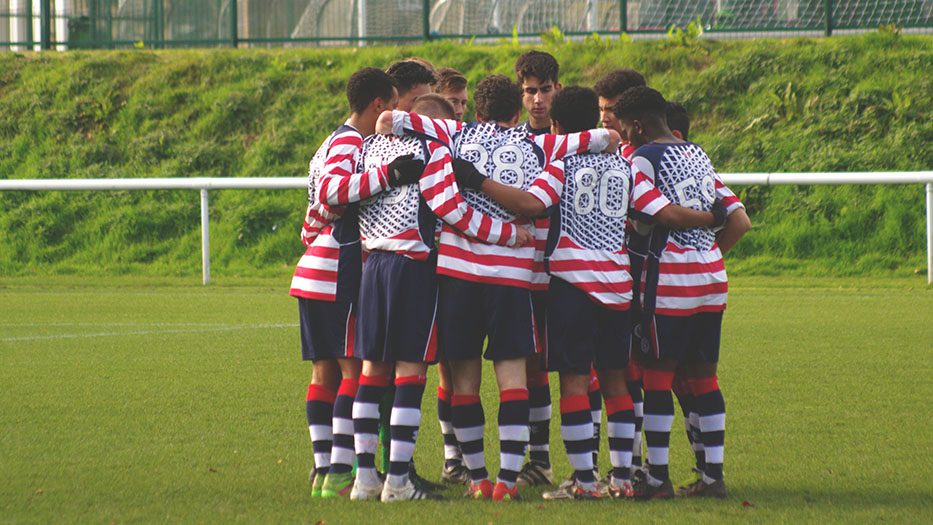Call now to apply through Clearing: +44 (0) 208 059 6413

Accommodation
Learn more ➝
Call now to apply through Clearing: +44 (0) 208 059 6413

UCAS CODES:
L100 – 4 YEARS
RF10 – 4 YEARS including summer semester(s) (Extended Degree)
SP10 – Sport Ed Ex

Degree
BA (Hons)
UK & US Degree
Optional Sport Pathways
Duration
4 Years (Full-time)
4 Years (Extended Degree)
Tuition Fees
UK ŌĆō ┬Ż9,250
EU, INT & US ŌĆō ┬Ż15,645
Economics is about a different way of thinking and looking at the world. You can ┬Ārely on the lens of economics to explain almost ┬Āanything about your environment.
This broad-ranging BA Economics degree offers formal and rigorous training in economic theory and offers many examples of their real-world applications, providing you with excellent career prospects and invaluable skills for life.
The first year at ┐ņ╗Ņ╩ėŲĄ commences like our other BA programmes with a pioneering liberal arts programme which is inter-disciplinary, encompassing areas such as science and creativity. This programme will develop your key transferable skills which include communication and creative thinking.┬Ā All in addition to a course which will give you a thorough grounding in economic ideas.
You will begin the second year with an introduction to modern economic history, followed by an exploration of the worlds of microeconomics and macroeconomics.
In your third and fourth years, youŌĆÖll be able to specialise in electives which appeal to you, as you choose from subjects such as Sustainable Strategic Management, Policy-Making in a Globalised World and Sustainable Development. Diversity and innovation are shown in courses like Behavioural Economics which will open up more opportunities.
YouŌĆÖll also have the opportunity to undertake an internship in a leading financial organisation, alongside a research project on a topic of your choice, improving your career options.
We run an active Economics and Investment Society ┬Āwhich organises talks and events, to give a fresh take on Economics. You can also participate in the events we organise for our Wellbeing Research Centre.
┐ņ╗Ņ╩ėŲĄ is the only university in the UK where the degree programmes are based on the US educational approach which is a four year pathway. Every undergraduate degree student will study our Liberal Arts programme alongside their Major.
Find out more about the Core Curriculum >>
YEAR 1Courses
Plus one of the following:
|
YEAR 2Courses
|
YEAR 3Courses
Plus one of the following:
|
YEAR 4Courses
Plus one of the following:
Integrated Internship
|
The information above is intended as an example only, featuring course details for the current year of study. In addition to the courses outlined above, there are open electives in each year. Course content and delivery can be subject to change. The number of courses taken by each student may also vary, depending on a range of factors such as transfer credits and academic performance. For more detailed information on the programme specification, please find more details here.
A normal course load per academic year is 30 US credits, equivalent to 120 UK credits. Students complete 120 UK credits at Level 6 in their chosen major.
The balance of assessment by examination, practical assessment and assessment by coursework will vary for each programme and will also depend on the optional electives you choose each year and may be subject to change. The methods of assessment can involve the use of term-papers, portfolios of work, quizzes, mid-semester and final exams as well as student presentations and general class discussion. Not every component applies to every course, but most do relate to many of the classes that are offered. Many of our courses involve a site visit or require attendance at a public lecture as well.
The approximate percentage of the broad assessment types for the programme, based on 2024/25 entry is as follows.
At ┐ņ╗Ņ╩ėŲĄ our undergraduate degree programmes, which are based on the US educational approach, are offered on a four year pathway. Every undergraduate degree student will first enter our Liberal Arts programme before specialising in their Major.
The entry requirements for all undergraduate degree programmes at ┐ņ╗Ņ╩ėŲĄ are the same, regardless of your chosen Major.
Below is information on our entry requirements for both 4 years and 4 years with foundation programmes.
4 YEARS
4 YEARS including summer semester(s) (Extended Degree) (Full-time)
Other international equivalent qualifications are accepted. We understand that not every student is in the same situation, if you have any questions about your qualifications, please get in touch with us admissions@richmond.ac.uk.
For more information on English Language Requirements for your country visit our How to Apply webpage.
There are many reasons why taking this programme with extended programme option could be the ideal choice; you may not have the exact subjects or grades at A level to meet the entry requirements, you may have tried other options such as apprenticeship and want to change direction or have been living abroad.
Whatever your starting point, studying this programme with┬Āextended programme option offers you a great opportunity to gain both a UK and US degree and start the adventure of a lifetime, studying with us in the worldŌĆÖs top student city.
This is what our extended programme option can offer you:
Undergraduate tuition fees for students starting their programme this academic year can be found in the table below.
| UK | EU / INT / US | |
| Fall 2024/Spring 2025 | Fall 2024/Spring 2025 | |
| Undergraduate Programmes
(per year) |
┬Ż9,250 | ┬Ż15,645 |
(Hint: Scroll left & right to view the full table)
For more information visit our┬ĀTuition Fees & Funding webpage.
The University offers personal development seminars, leadership opportunities and access to work experience, volunteering and internships. There is also a dedicated, personalised service for assistance with CV writing, interview preparation tips and much more.
Throughout your studies, you will have the opportunity to build links with industry experts and ┐ņ╗Ņ╩ėŲĄ alumni, connecting you to a vast and influential worldwide network.
We offer career support and advice through our Careers & Internships Office that will assist and guide you in your study choices to make sure you stand out from the crowd when you graduate. Whether you are interested in gaining work experience in London or internationally, we will be here to help you find the best possible opportunities.
Through internships you will gain┬Ābusiness acumen, beneficial work experiences and transferable skills┬Āwhich will give you a competitive advantage in a fast-paced working environment.
Work while you study across 5 continents through our partners┬Ā╠²▓╣▓į╗Õ╠²┬Āwith destinations in Spain, Argentina, South Africa, China, Japan, Vietnam and Australia.
Below is a list of where some of the graduates of this programme have gone on to work.
You can apply one of three ways, either apply directly┬Āthrough us, apply through┬ĀUCAS┬Āand for our US students, via the┬ĀCommon Application╠²($50.00).
In order to submit your application you will need the following information
Visit our┬ĀHow to Apply webpage┬Āfor more information regarding Entry Requirements, admissions processes and to start your application.
We encourage you to complete your application as early as possible, even if you are completing your undergraduate programme of study. In this case you will be offered a place that is conditional on successfully completing a specified qualification and English language qualification if applicable.
If you would like your application to be considered for a ┐ņ╗Ņ╩ėŲĄ bursary, an early application is strongly recommended.

“Our BA in Economics provides students with the skills needed to succeed in an ever changing, and unpredictable world. This rigorous programme is both flexible and versatile thus enabling students to meet the work challenges of the 21st century with confidence.ŌĆØ
Professor Greg Gannon
Head of ┐ņ╗Ņ╩ėŲĄ Business School
ŌĆ£┐ņ╗Ņ╩ėŲĄŌĆÖs Art History and Visual Culture programme has fostered my passion for the field and prepared me well for a career in art history and museums. Against the backdrop of LondonŌĆÖs museums and creative communities, the programmeŌĆÖs faculty, courses, and events provided me the edge of experience and knowledge needed to accomplish my goals.ŌĆØ
ŌĆ£I came to ┐ņ╗Ņ╩ėŲĄ University as a transfer student from an American University in Switzerland and due to the double degree that ┐ņ╗Ņ╩ėŲĄ uniquely offers the transition was easy.
I graduated in 2017 and when looking back at my ┐ņ╗Ņ╩ėŲĄ University experience, as it is the UKŌĆÖs pioneering Liberal Arts University, it was really great as you truly have the art world at your doorstep in London. In fact I think what IŌĆÖve enjoyed the most was the way they entwine the academic program with real life hands-on experiences that the city and surrounding of London offers, but also how it is located close to Europe.
Furthermore personally my research for my graduation thesis on the topic of ŌĆśCuratingŌĆÖ ultimately also became the foundation of my start-up, that today is Dynamisk Independent Curating and Art Advisory.ŌĆØ
Sign up and find out about our programmes, generous scholarships and what life is like at ┐ņ╗Ņ╩ėŲĄ.
All Undergraduate students have the option to Study Abroad for a semester or entire academic year. We offer students the opportunity to study abroad with our partners in:
USA | CHINA | AUSTRALIA | NEW ZEALAND | GREECE | BELGIUM | FRANCE | ARGENTINA | SOUTH KOREA | SPAIN
and many more places around the word.

RIASA is excited to announce that from September 2025, we will be expanding our UK college soccer offering by launching our first-ever London Roster. Aspiring student-athletes will have the choice of 30 undergraduate and postgraduate programmes – all US/UK dual accredited, alongside a challenging and rewarding soccer development programme.

Sport Ed Ex combines the provision of performance coaching and playing pathways in Rugby and Cricket for aspiring athletes (men and women) aged 18 and over with the opportunity to study at ┐ņ╗Ņ╩ėŲĄ American University London, offering students the unique opportunity to study a wide variety of dual accredited (US/UK) undergraduate degree courses.
Join student Emma and Head of ┐ņ╗Ņ╩ėŲĄ Business School, Professor Sabine Spangenberg for an interview about our Economics programme at ┐ņ╗Ņ╩ėŲĄ American University London.




Flick through and download our Undergraduate Prospectus to find out more about the programme, integrated internships & unique career opportunities.



